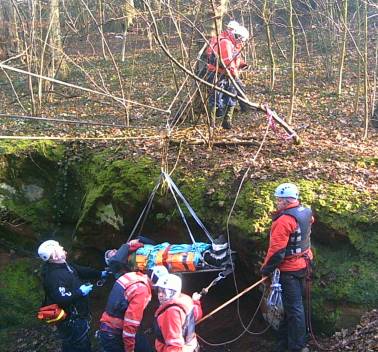Training
Training is probably the hardest part of being a member of the Search and Rescue Team.
One of our members is a qualified instructor in water safety and is an experienced climber.
He makes everything as hard as he can for the Team's expertise.
He has brought the Team from useless to almost brilliant!
Before long they will be qualified to use ropes on low level recoveries.
Cheshire Search and Rescue team undertake some of the most extensive training available.
The main training is set by ALSAR and taught by team members and also by invited guests.
The training takes place on a fortnightly basis and is attended by most members.
ALSAR have training available for team members in Wiltshire for more in-depth courses,
such as Search Controller Certificate.
Some of the training we give:-
Basic Search Technician
The BST includes missing person behaviour, search techniques,
hierarchy, anatomy of a callout, current law and legislations,
working with families, media and vulnerable adults/children
(in line with Vulnerable Adult and Child Protection Act)
and how to be a team player.
Missing Person Behaviour
Missing person behaviour covers all categories of individuals missing
from young children to a party of walkers. But in Cheshire we specialise
in vulnerable individuals and despondents. Our search areas, decided
by our Search Controllers, enable us to prioritise
areas in order to quickly locate the missing person effectively and efficiently.
Thanks go to the UK Missing Person Behaviour Study by Dave Perkins
and Pete Roberts at Northumberland National Park SRT, the Centre for Research
and Ged Feeney, Penrith MRT Statistics Officer.
Health and Safety
All team members are taught dynamic risk assessment to ensure they can
adapt to any situation while on a search and also in the training sessions.
It is taught that Health and Safety assessment is not only the responsibility of trainers
or team leaders, but of all team members, this again ensures a good team relationship is maintained.
Working near water
Cheshire is an area surrounded by rivers and canals due to the industrial revolution
and so it's important that all team members are regularly taught safe working techniques
around and near water. Cheshire SAR team is committed to providing opportunities
for everyone to learn safely in a controlled environment and to be aware of constantly
changing laws and legislations.
Rope safety
There are also many steep hills and cliffs in Cheshire which could happen to be in a search area.
The team has a registered rope trainer to enable all Search Team members to be confident
searching on steep ground and, if necessary, rescue a person in distress effectively and efficiently
with Team safety being paramount.
Casualty care
Search and Rescue utilise the knowledge of medical personnel within the team
to train all their members in basic first aid skills and, for those capable, an advanced Casualty Care course.
The course covers advanced techniques eg. difficult extrication, spinal immobilisation, rapid triage,
evacuation and much more.
Search Management
When on a live search it is important to have a recognised hierarchy of leadership, within Search
and Rescue Team. This consists of a Search Controller who manages the operations of the team
and within the Team there are smaller teams. The hierarchy is a simple but effective process and a
basic formation is as follows: Search Controller, Team Leader, Basic Search Technician.
Aside from this there are many areas of operational support that can be called upon such as:
Radio Operator, Welfare Officer, Technical Rescue Team and a Medical Rescue team.
Working with the Statuatory Emergency Services
The police oversee all missing person searches and a designated Police Search Advisor
is allocated to the team.
Other instances of working with all Emergency Services are in the occurrence of a major incident.
This gives the team the opportunity to work with Police, Fire and Ambulance personnel.
Communications
Cheshire Search and Rescue has a number of members who are trained in radio procedure and
all members of the team have been trained in basic radio use and care of the radios on a live search.
Navigation
Whether on a training exercise or on a live search, it is imperative that team members are orientated
as to their surroundings and exact location. The maps used by the team are unified and all members are
trained in how to read grid references which ensures that every team member has full information and
knows the location of the entire team at all times on a search.
Here are some pictures of the Team training:-





Training is hard and leaves members exhausted
but it is the only way to get experienced enough to safely rescue people who are in trouble.
Keep at it, Cheshire Lowland Search and Rescue Team,
you're doing a great service for the people of Cheshire.









